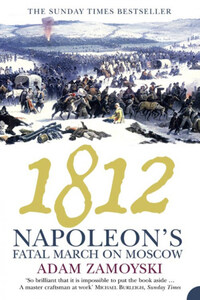Europe in 1811
Russia’s expansion in the west, 1772–1812
The Russian Armies of the West
French and Russian dispositions in June 1812
The French advance
The advance to Vitebsk
The Rudnia offensive and Napoleon’s Smolensk manoeuvre
The battle for Smolensk
Lubino – Valutina Gora
The Russian positions at Borodino
Borodino. The morning attacks
Borodino. The final assault
Kutuzov’s retreat from Moscow
Maloyaroslavets
The retreat
The view from Smolensk
Krasny, 15–16 November
Krasny, 16 November
Krasny, 17–19 November
The closing trap, 21 November
The Berezina manoeuvre
The Berezina crossing
The strategic situation at the beginning of December
Statistical chart showing the outward march and retreat of all the forces which crossed the Niemen
Babinovitse: Babinowicze (Polish), present-day Babinavicy (Belarus)
Berezina: Berezyna (Polish), present-day Bjarezina (Belarus)
Beshenkoviche: Bieszenkowicze (Polish), present-day
Bešankovicy (Belarus)
Bobr: Bóbr (Polish), present-day Bobr (Belarus)
Borisov: Borysów (Polish), present-day Barysau (Belarus)
Brest: Brzesc (Polish), present-day Brést (Belarus)
Dnieper: Dniepr (Polish), present-day Dnjapro (Belarus)
Drissa: Dryssa (Polish), present-day Verhnjadzvinsk (Belarus)
Dubrovna: Dubrowna (Polish), present-day Dubrovno (Belarus)
Dunaburg: Dzwinsk (Polish), present-day Daugavpils (Latvia)
Glubokoie: Głebokie (Polish), present-day Glybokae (Belarus)
Grodno: Grodno (Polish), Grodna (Belarus)
Kobryn: Kobryn (Polish), present-day Kobryn (Belarus)
Kovno: Kowno (Polish), present-day Kaunas (Lithuania)
Ladi: Lady (Polish), present-day Liadi (Belarus)
Loshnitsa: Łosznica (Polish), present-day Lošnica (Belarus)
Miedniki: Miedniki (Polish), present-day Medininkai (Lithuania)
Minsk: Minsk (Polish), present-day Minsk (Belarus)
Mogilev: Mohylów (Polish), present-day Magilev (Belarus)
Molodechno: Mołodeczno (Polish), present-day Maladzecna (Belarus)
Mstislav: Mscislaw (Polish), present-day Mscislav (Belarus)
Niemen (river): Niemen (Polish), present-day Nemunas (Lithuania)
Nieshviezh: Nieswiez (Polish), present-day Njasviž (Belarus)
Orsha: Orsza (Polish), present-day Orša (Belarus)
Oshmiana: Oszmiana (Polish), present-day Ašmjany (Belarus)
Ostrovno: Ostrowno (Polish), present-day Astrovna (Belarus)
Pleshchenitse: Pleszczenice (Polish), present-day Plescanicy (Belarus)
Polotsk: Polock (Polish), present-day Polack (Belarus)
Ponary: Ponary (Polish), Panarai (Lithuania)
Shvienchiany: Swieciany (Polish), present-day Svencionys (Lithuania)
Smorgonie: Smorgonie (Polish), present-day Smarhon’ (Belarus)
Studzienka: Studzienka (Polish), present-day Studenka (Belarus)
Tolochin: Toloczyn (Polish), present-day Talacyn (Belarus)
Troki: Troki (Polish), Trakai (Lithuania)
Vesselovo: Weselowo (Polish), Veselovo (Belarus)
Vilia: Wilja (Polish), present-day Neris (Lithuania)
Vilna: Wilno (Polish), present-day Vilnius (Lithuania)
Vitebsk: Witebsk (Polish), present-day Vicebsk (Belarus)
Volkovisk: Wołkowyski (Polish), present-day Vavkavysk (Belarus)
Zakrent: Zakret (Polish)
Ziembin: Ziembin (Polish), present-day Zembin (Belarus)
Napoleon’s invasion of Russia in 1812 was one of the most dramatic episodes in European history, an event of epic proportions, etched deeply in the popular imagination. I only had to mention the subject of this book for people to come to life, stirred by recollections of Tolstoy’s War and Peace, by the scale of the tragedy, by some anecdote that had lodged itself in their memory, or just a mental image of snowbound Napoleonic tragedy. But the flash of recognition was almost invariably followed by an admission of total ignorance of what had actually happened and why. The reasons for this curious discrepancy are fascinating in themselves.
No other campaign in history has been subjected to such overtly political uses. From the very beginning, studies of the subject have been driven by a compulsion to interpret and justify that admits of no objectivity, while their sheer volume – over five thousand books and twice as many articles published in Russia alone in the hundred years after 1812 – has helped only to cloud the issue.>1
This was to be expected, considering what was involved. There were great reputations at stake: those of Napoleon, of Tsar Alexander, of Field Marshal Kutuzov, to name only the obvious ones. There was also a need to make sense of the whole business, for this war, unprecedented in the history of Europe in both scale and horror, was not easy to assess in military terms. The action was often confused. Both sides claimed victory in every engagement. And if the French had lost the campaign, the Russians could hardly be said to have won it. At the same time, people on both sides had behaved with a savagery that neither nation wished to contemplate.














